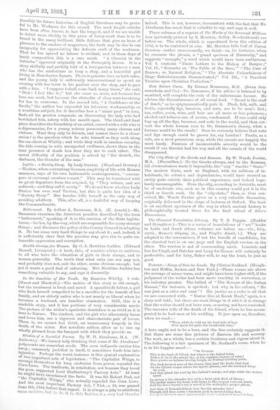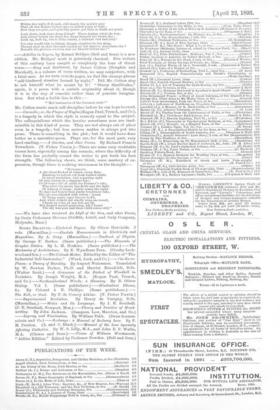PORTE:Y.—Songs of Sunrise Lands. By Clinton Scollarl. (Hough- ton and
Mifflin, Boston and New York.)—These verses are above the average of minor verse, and might have been higher still, if the judgment of the writer had been more exacting in correction, or his industry greater. The ballad of "The Mosque of the Sultan Hassan," for instance, is spirited ; but why in the refrain, "He was just as a ruler and man "? His justice as a ruler is all that we are concerned with. "Easter Eve at Kerak Moab," again, is a story well told ; but there are weak things in it which it is strange that the writer should not have seen, or seeing, not have corrected. The narrator tells of the death of his friend, whom he has accom- panied to be best-man at his wedding. It jars upon us, therefore, when we read :— "Then, while he told me his fond tale of love Over again for quite the hundredth time."
A. hero ought not to be a bore, and the line certainly suggests it. But there are some fine pictures of Eastern life and scenery. The work, as a whole, has a certain freshness and vigour about it. The following is a fair specimen of Mr. Scollard's verso, when he is in his happier mood :—
"Is GILEAD.
This is the land of (1 Henri, but where is the fabled balm, Unless it lie in the placid sky, in the sapphire leagues of calm?
Hero grows no balsam-hearing bough, no frultage-yielding palm. The duk.broworl sons of the desert, they tend the flocks that feed On the hillside slopes Where the myrtle gleams, and the mustard wings its seed,
And they pluck the rood by the Jabbok's margo, and pipe while the waters
speed.
In spring is the oleander fair with a faint pink flush of bloom;
The jackal makes his home with kings in the deepest rook-out tomb, And the fierce hyena's cry is weird in the midnight's purple gloom.
And thou, 0 Hamoth-Gilead, how lies thy splendor low Though still does Jedur s fountain gush in never-failing flow,
And purl through sweet pemegrannke.besve.s and olive qrovna Irlow. Within thy walls, 0 Jerash, still stands thy mighty gate That oft saw Roman legions pass in gilded pomp of state ; Now they are gone, and gone thy power, yet thou in death art great.
Look down, look down from Gilead I There Jordan winds its way, And silvery bright the Dead Sea sloops beneath the tropic day ; Look up, look up, where Nebo stands, a bulwark vast and gray
Yet who would bide in Gilead, though cloudless be her skies, Though stair on stair through crystal air her massive mountains rise P Beneath the glorious western star our blessOil Gilead lies I"
—Achilles in Scyros, by Robert Bridges (Bell and Sons) is a new edition. Mr. Bridges' work is genuinely classical. Few writers of this century have caught so completely the tone of Greek verse.—Song and Sentiment, by James Cotton (Simpkin and Marshall), is a volume of verse written, we may conjecture, with a fatal ease. As we turn over its pages, we find the strange phrase "self-hindered slumber booned by night." Did Mr. Cotton stop to ask himself what he meant by it ? "Starry Similitudes," again, is a poem with a certain originality about it, though it is in the way of conceits rather than of genuine imagina- tion. But what a feeble line is this :—
"'Mid luminaries of the foremost rank !"
Mr. Cotton wants much self-discipline before he can hope to excel. — Carmelo. ; or, the Plague of Naples (Kegan Paul, Trench, and Co.), is a tragedy in which the style is scarcely equal to the subject. The colloquialisms which the heroine sometimes uses are inad- missible in this kind of poem. They are not always out of place even in a tragedy; but less serious matter is always put into prose. There is something in the plot ; but it would have done better as a narrative-poem. Plays are, for the most part, very hard reading.—A Garden, and other Poems. By Richard Francis Towndrow. (T. Fisher Enwin.)—There are some very creditable verses here, especially among the sonnets, where the difficulty of the form has probably roused the writer to put forth his best strength. The following shows, we think, some mastery of ex- pression, though there is nothing uncommon in the thought :—
"moTABILITY, A sky cloud-flecked at sunset, every flake Blushing to softest red from feather-white In sweet gradation, just a parting sight Of rosy islands in a sapphire lake; Child-voiees full of mirth for Summer's sake
Who gives the merry hay-fields and the light Of longest ev'nings : slowly conies the night To days and hearts that gladly brightness take. The eye was satisfied with colour sound
Of living music came the ear to fill, And, while delight did wholly wrap me round, I knew no sense of any loss nor But deemed myself possessing, till I found The sky was grey and those child-voices still."
—We have also received An Idyll of the Sun, and other Poems, by Orrin Cedesman Stevens (Griffith, Axtell, and Cady Company, Holyoake, Mass.)







































 Previous page
Previous page